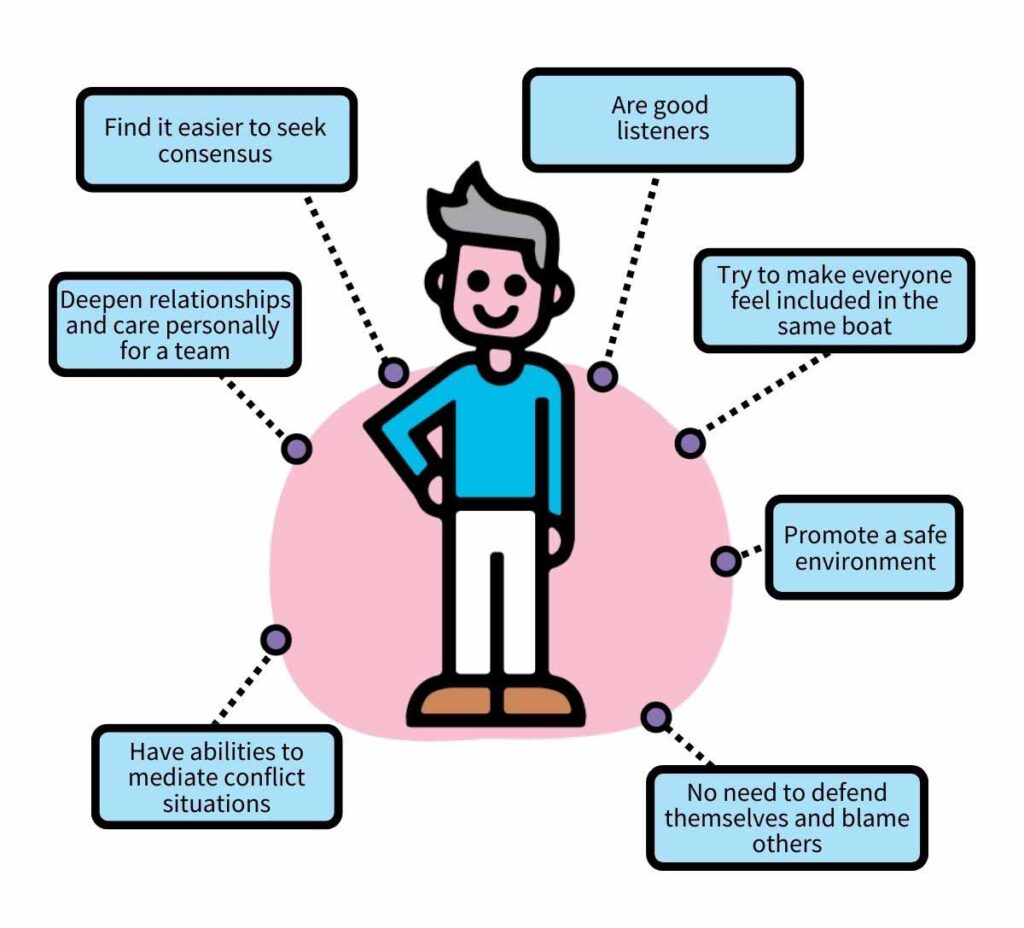Physical Address
304 North Cardinal St.
Dorchester Center, MA 02124
Physical Address
304 North Cardinal St.
Dorchester Center, MA 02124

Introverted leaders excel through deep listening, focus, and logical decision-making. Despite challenges like self-doubt and visibility, introverts thrive by embracing their unique strengths, leading effectively and authentically in diverse settings.
Introverted leaders possess unique qualities that often set them apart in leadership roles. While introverts prefer solitude and introspection, these traits can translate into valuable leadership skills. One key strength is their ability to listen deeply, fostering engagement and understanding within their teams. They also prioritize reliable data and thoughtful reflection, making decisions grounded in logic rather than emotion. In a world of distractions, introverted leaders excel at maintaining focus, ensuring strategic and effective leadership.
However, introverted leaders face challenges, such as self-doubt and the struggle for visibility in group settings. Despite their competence, they may question their leadership capabilities or feel overshadowed in larger meetings. The pressure to conform to extroverted leadership expectations can also create internal conflicts, where introverts grapple with authenticity versus societal norms. Additionally, the energy demands of leadership can leave introverts feeling drained, complicating their ability to connect with their teams.
By embracing their strengths, such as active listening, focus, and logical decision-making, introverted leaders can excel while navigating these challenges.
Exploring Introversion and Leadership

Introversion is defined as a personality type within the five-factor trait theory that describes how a person recharges their energy, specifically through internal means and introspection. It is characterized by a preference for solitude, inward reflection, self-awareness, independent relationships, small intimate settings, and enjoyment of research and study. Neurochemically, introverts’ reward pathways are activated by different stimuli compared to extroverts. Introversion exists on a continuum, with most people falling between pure introversion and extroversion. It is distinct from shyness or social aversion, as it is neither an emotion nor a disorder, but rather a fundamental aspect of personality.

Leadership—often hailed as the art of turning vision into reality—is far more nuanced than it might initially seem. It’s not just about setting a course; it’s about crystallizing an idea, shaping a destination in the mind’s eye, and then, with energy and finesse, breathing life into it. At its core, leadership demands one to not only chart a direction but to communicate that path with such clarity and conviction that others feel compelled to follow.
But here’s the thing—true leadership doesn’t hinge on titles, nor is it confined to positions of power. It can surface anywhere, in anyone, whenever someone rises to inspire, to galvanize those around them toward a unified goal. Whether in a bustling boardroom or an impromptu community gathering, the essence of leadership lies in its ability to ignite action, to kindle shared purpose.
Now, what sets successful leaders apart? It’s not just charisma or raw talent. It’s a blend of nuanced skills, often subtle but undeniably potent. High social intelligence—knowing when to push, when to pull, when to listen. Adaptability—because, let’s face it, the world is ever-shifting. And then, there’s self-awareness—the quiet, introspective ability to recognize one’s own strengths and weaknesses, adjusting the sails accordingly.
In the end, leadership is about more than just ideas. It’s about honing the ability to turn vision into action, guiding people through uncharted waters with an unwavering focus on what truly matters. That’s where real impact lies—within the intersection of clarity, adaptability, and the collective drive toward a common destination.

Leadership—a term brimming with complexity and nuance—has been dissected and analyzed through countless studies, each striving to uncover the elusive qualities that characterize a successful leader. Yet, amid this vast sea of research, a singular truth emerges: there is no universally applicable formula for leadership excellence. Despite extensive investigations, definitive, peer-reviewed consensus remains a mirage, forever just out of reach (Andersen, 2006; Do & Mai, 2020).
Why, you may wonder, does this ambiguity persist? The answer lies nestled within the intricate tapestry of context. Leadership is not a static construct; it shifts and morphs depending on the situation at hand. Each scenario calls for a distinct approach, a different set of skills. What flourishes in one environment may falter in another. Yet, amid this variability, certain traits emerge as consistently beneficial, transcending circumstances and challenges. Intriguingly, many of these invaluable skills often reside within introverted leaders. Let’s delve into the Advantages of Introvert Leadership and unravel why these traits are so essential.
Listening—an art form often eclipsed by the clamorous demands of leadership—is perhaps the most critical yet frequently neglected skill in a leader’s repertoire. Too often, leaders succumb to the pressure of being the answer-givers, feeling compelled to project unwavering control and unshakeable confidence. This perception, however, is fundamentally flawed. Leaders who prioritize listening cultivate deeper engagement, tapping into the collective wisdom of their teams, and gleaning insights that foster a richer understanding of complex situations. This ability equips them to make decisions that are not just informed but also nuanced and empathetic.
A hallmark of introverted leaders is their predilection for meticulous research and reliable data. They excel at sifting through a multitude of information, distilling empirical evidence that informs their decisions. While extroverted counterparts may thrive in the vibrant arena of dialogue and interpersonal exchanges, introverted leaders lean heavily on the bedrock of facts, scholarly articles, and peer-reviewed studies. This analytical approach, steeped in objectivity, ensures that their decision-making is not merely a reflection of personal biases or fleeting opinions but is instead rooted in solid, evidence-based foundations.
In the realm of effective leadership, the ability to reflect emerges as a cornerstone, particularly for introverts. Engaging in active listening, scrutinizing data, and weighing options thoughtfully, these leaders craft responses that are not merely reactive but are strategically considered. This method of deliberate reflection, contrasting sharply with impulsive reactions, frequently culminates in more favorable outcomes. It is a process woven into the very fabric of the introverted personality.
Introverted leaders are distinguished by their remarkable capacity to step back before responding. In the crucible of high-stress situations, they don’t rush to react; instead, they pause, gather pertinent information, and deliberate on their options. This conscious delay ensures their decisions spring from a wellspring of logic rather than being swept away by the turbulent tides of emotion. This distinction is critical—emotionally charged reactions can obscure judgment and complicate problem-solving, leading to pitfalls that might have been easily avoided.
One of the unique advantages introverted leaders possess is their ability to maintain laser-like focus, even amidst a cacophony of distractions. In an era that often glorifies multitasking, introverts have a natural proclivity to minimize interruptions, remaining steadfastly committed to their current task. This focused mindset counters the often-detrimental “multitasking fallacy,” which can fragment attention and escalate stress. By honing in on a singular objective, introverted leaders can cultivate a more strategic and effective leadership approach.
If you resonate with the introverted identity, let not the shadow of doubt deter you from pursuing leadership roles. You embody qualities that can render you an exceptional leader. Skills like active listening, thoughtful reflection, and logical decision-making are not just beneficial; they are essential in guiding teams toward success. Conversely, extroverts can also benefit from integrating these introverted strengths into their leadership styles. This integration can enhance personal effectiveness and foster a more balanced, thoughtful approach to leading others.

→ Obstacles Encountered by Introverted Leaders
In the intricate tapestry of leadership, introverted leaders find themselves weaving through a landscape rich with both opportunity and formidable challenges. While they harbor a wealth of valuable traits—thoughtfulness, deep listening, and analytical prowess—these very attributes can become overshadowed by the hurdles they encounter. Let’s delve into the labyrinth of their struggles.
Whispers of Self-Doubt
A pervasive shadow that looms over many introverted leaders is the insidious specter of self-doubt. They may find themselves trapped in a cycle of uncertainty, plagued by questions that gnaw at their confidence: “Am I genuinely equipped to lead my team?” Despite their considerable expertise, this internal dialogue can manifest as a reluctance to embrace their leadership mantle. Consider a talented manager whose technical acumen is exceptional, yet falters at the thought of guiding their team through complex decisions—how can they trust their instincts when the echoes of doubt reverberate in their minds?
The Mirage of Leadership Skills
Amidst their contemplative nature, many introverted leaders grapple with the notion that they lack the requisite skills for effective leadership. They often find themselves pondering: “Where on earth do I even start to develop these elusive skills?” The weight of this uncertainty can be paralyzing. Take, for instance, an introverted team leader who possesses a vast reservoir of knowledge yet hesitates to delegate tasks. They might fear that their inherent reticence renders them incapable of inspiring others, even though they are a treasure trove of expertise waiting to be shared.
The Quest for Visibility
Visibility in leadership—ah, what a conundrum! Despite possessing a quiet confidence in their abilities, introverted leaders often find their contributions obscured in the cacophony of group dynamics. They thrive in intimate, one-on-one settings, yet this strength can morph into a disadvantage in larger assemblies, where their voices may fade into the background. Imagine a brilliant project manager, meticulously crafting detailed plans, yet faltering in the spotlight of team meetings—how many insightful contributions slip through the cracks, unheard and unrecognized?
Authenticity vs. Expectation
The struggle for authenticity is a significant obstacle on the road to effective leadership. Introverted leaders often wrestle with feelings of inauthenticity, fearing that embracing assertiveness might alienate their true selves. This internal conflict can create a chasm between their natural inclinations and the conventional expectations of leadership. Picture an introverted executive, deeply reflective and contemplative, who feels compelled to adopt an extroverted façade—how can they reconcile their authentic self with the persona they believe is necessary for success?
The Weight of Time and Energy
Lastly, the relentless demands of leadership can often feel insurmountable. Many introverted leaders experience an overwhelming sense of fatigue, as they juggle a multitude of responsibilities that leave little room for further obligations. The looming question, “How can I lead effectively when I’m already stretched to my limits?” is a constant companion. Consider a committed employee balancing multiple projects, feeling too drained to participate in vital team-building exercises—how can they foster connection and collaboration when the very essence of their energy is being sapped away?
In this intricate dance of leadership, introverted leaders must navigate their unique challenges, drawing upon their inner strengths while addressing the hurdles that impede their path. By acknowledging and tackling these obstacles head-on, they can unlock their true potential, embracing a leadership style that is authentic, impactful, and profoundly their own.